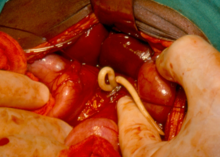
Back التهاب الديدان الطفيلية المنقولة بالتربة Arabic داء الديدان الطفيليه المنقوله بالتراب ARZ Helmintosi transmesa per terra Catalan Helmintiasis transmitida por el suelo Spanish عفونت کرمی منتقلشده از خاک Persian Géohelminthiases French Cacingan yang ditularkan melalui tanah ID
This article needs to be updated. (July 2023) |
| Soil-transmitted helminthiasis | |
|---|---|
| Other names | STH |
 | |
| Adult ascaris worms being removed from the bile duct of a patient in South Africa | |
Soil-transmitted helminthiasis is a type of worm infection (helminthiasis) caused by different species of roundworms. It is caused specifically by those worms which are transmitted through soil contaminated with faecal matter and are therefore called soil-transmitted helminths. Three types of soil-transmitted helminthiasis can be distinguished: ascariasis, hookworm infection and whipworm infection. These three types of infection are therefore caused by the large roundworm A. lumbricoides, the hookworms Necator americanus or Ancylostoma duodenale and by the whipworm Trichuris trichiura.
It has become the most common parasitic disease of humans worldwide.[1] Approximately two billion people (about a third of global population) are infected as of the latest estimate, and four billion at risk, surpassing even the all-time most prevalent parasitic disease, malaria.[2] The largest numbers of cases occur in impoverished rural areas of Sub-Saharan Africa, Latin America, Southeast Asia, and China.[3] Its main cause, like for many types of helminth infections, is lack of sanitation, such as the practice of open defecation, lack of hygiene such as hand washing and walking barefoot on contaminated soil.[4][5][6] It is regarded as one of the world's most important causes of intellectual and physical retardation.[7]
The helminthic disease is so named because the infection is transmitted through ingestion of the nematode eggs in the soil, which is contaminated through excrements. Therefore, the disease is most prevalent in warm and moist climates where sanitation and hygiene are poor and waters are unsafe, including the temperate zones during warmer months. STH is categorised among neglected tropical diseases because it inflicts tremendous disability and suffering, which can be clinically treated and relatively easily be prevented (primarily through improved sanitation), yet negligible attention has been given for many years.[8] It is now among the target diseases of London Declaration on Neglected Tropical Diseases (launched on 30 January 2012) to be controlled/eradicated by 2020.[9]
Simple prevention and control strategies are access to improved sanitation, public awareness on personal hygiene and health education.
- ^ Lo, Nathan C.; Heft-Neal, Sam; Coulibaly, Jean T.; Leonard, Leslie; Bendavid, Eran; Addiss, David G. (2019-11-01). "State of deworming coverage and equity in low-income and middle-income countries using household health surveys: a spatiotemporal cross-sectional study". The Lancet Global Health. 7 (11): e1511–e1520. doi:10.1016/S2214-109X(19)30413-9. ISSN 2214-109X. PMC 7024997. PMID 31558383.
- ^ "Soil-transmitted helminth infections Fact sheet N°366". who.int. April 2014. Retrieved 18 October 2014.
- ^ WHO (2012). Eliminating Soil-transmitted Helminthiasis as a Public Health Problem in Children: Progress Report 2001–2010 and Strategic Plan 2011–2020 (PDF). WHO Press, World Health Organization, Geneva, Switzerland. pp. 1–78. ISBN 978-92-4-150312-9.
- ^ "CDC - Hookworm". 17 April 2019.
- ^ Ziegelbauer K, Speich B, Mäusezahl D, Bos R, Keiser J, Utzinger J (January 2012). "Effect of sanitation on soil-transmitted helminth infection: systematic review and meta-analysis". PLOS Medicine. 9 (1): e1001162. doi:10.1371/journal.pmed.1001162. PMC 3265535. PMID 22291577.
- ^ Strunz EC, Addiss DG, Stocks ME, Ogden S, Utzinger J, Freeman MC (March 2014). "Water, sanitation, hygiene, and soil-transmitted helminth infection: a systematic review and meta-analysis". PLOS Medicine. 11 (3): e1001620. doi:10.1371/journal.pmed.1001620. PMC 3965411. PMID 24667810.
- ^ Bethony J, Brooker S, Albonico M, Geiger SM, Loukas A, Diemert D, Hotez PJ (May 2006). "Soil-transmitted helminth infections: ascariasis, trichuriasis, and hookworm". Lancet. 367 (9521): 1521–32. doi:10.1016/S0140-6736(06)68653-4. PMID 16679166. S2CID 8425278.
- ^ "Neglected Tropical Diseases". cdc.gov. June 6, 2011. Retrieved 28 November 2014.
- ^ London Declaration (2012) (30 January 2012). "London Declaration on Neglected Tropical Diseases" (PDF). Retrieved 2013-03-26.
{{cite web}}: CS1 maint: numeric names: authors list (link)
© MMXXIII Rich X Search. We shall prevail. All rights reserved. Rich X Search